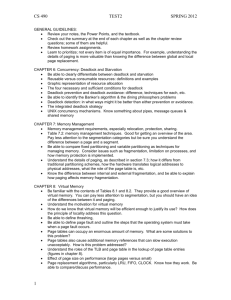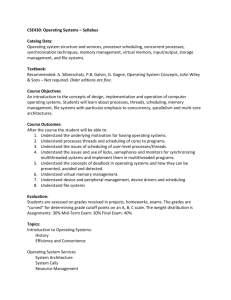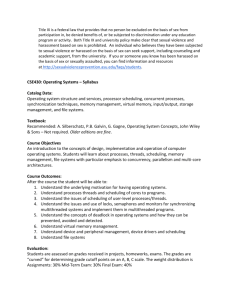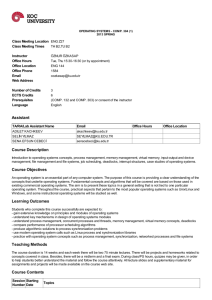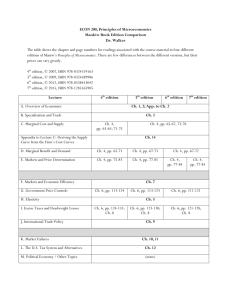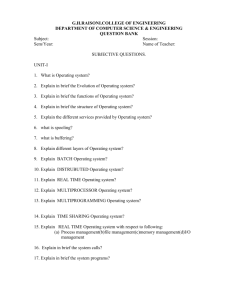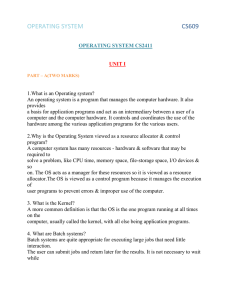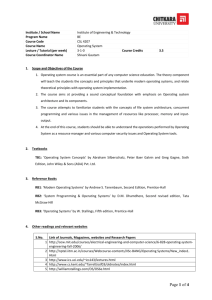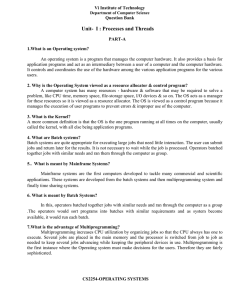09CS212 OPERATING SYSTEM Credits: 3:0:0 Course Objective: To
advertisement
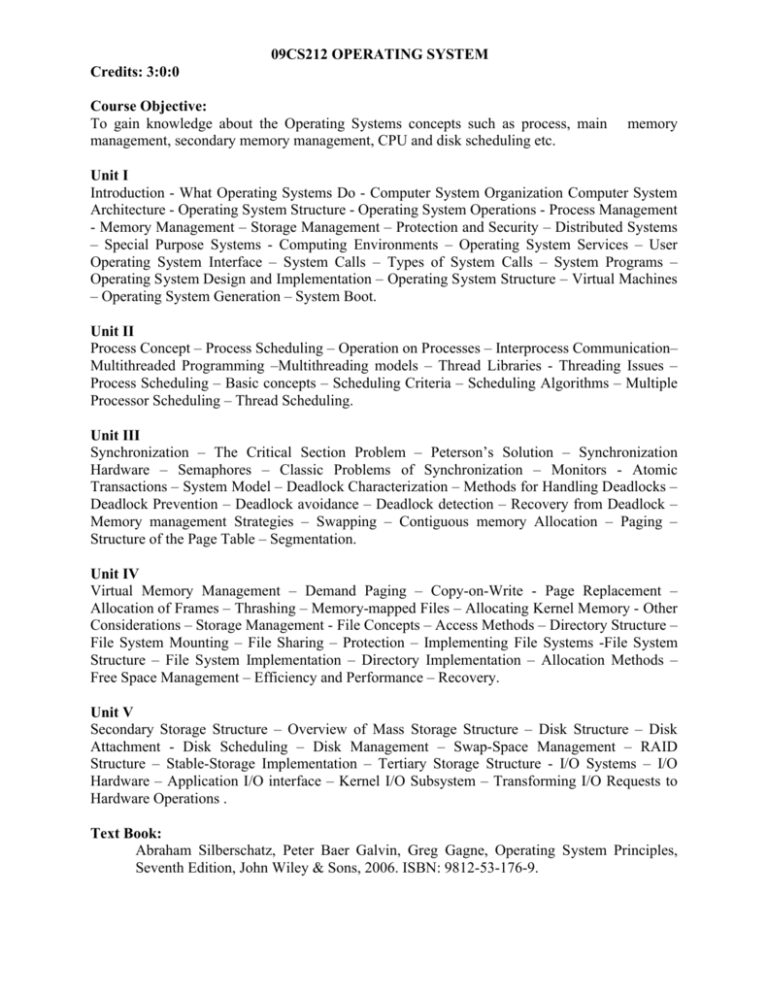
09CS212 OPERATING SYSTEM Credits: 3:0:0 Course Objective: To gain knowledge about the Operating Systems concepts such as process, main management, secondary memory management, CPU and disk scheduling etc. memory Unit I Introduction - What Operating Systems Do - Computer System Organization Computer System Architecture - Operating System Structure - Operating System Operations - Process Management - Memory Management – Storage Management – Protection and Security – Distributed Systems – Special Purpose Systems - Computing Environments – Operating System Services – User Operating System Interface – System Calls – Types of System Calls – System Programs – Operating System Design and Implementation – Operating System Structure – Virtual Machines – Operating System Generation – System Boot. Unit II Process Concept – Process Scheduling – Operation on Processes – Interprocess Communication– Multithreaded Programming –Multithreading models – Thread Libraries - Threading Issues – Process Scheduling – Basic concepts – Scheduling Criteria – Scheduling Algorithms – Multiple Processor Scheduling – Thread Scheduling. Unit III Synchronization – The Critical Section Problem – Peterson’s Solution – Synchronization Hardware – Semaphores – Classic Problems of Synchronization – Monitors - Atomic Transactions – System Model – Deadlock Characterization – Methods for Handling Deadlocks – Deadlock Prevention – Deadlock avoidance – Deadlock detection – Recovery from Deadlock – Memory management Strategies – Swapping – Contiguous memory Allocation – Paging – Structure of the Page Table – Segmentation. Unit IV Virtual Memory Management – Demand Paging – Copy-on-Write - Page Replacement – Allocation of Frames – Thrashing – Memory-mapped Files – Allocating Kernel Memory - Other Considerations – Storage Management - File Concepts – Access Methods – Directory Structure – File System Mounting – File Sharing – Protection – Implementing File Systems -File System Structure – File System Implementation – Directory Implementation – Allocation Methods – Free Space Management – Efficiency and Performance – Recovery. Unit V Secondary Storage Structure – Overview of Mass Storage Structure – Disk Structure – Disk Attachment - Disk Scheduling – Disk Management – Swap-Space Management – RAID Structure – Stable-Storage Implementation – Tertiary Storage Structure - I/O Systems – I/O Hardware – Application I/O interface – Kernel I/O Subsystem – Transforming I/O Requests to Hardware Operations . Text Book: Abraham Silberschatz, Peter Baer Galvin, Greg Gagne, Operating System Principles, Seventh Edition, John Wiley & Sons, 2006. ISBN: 9812-53-176-9. Reference Books: 1. D. M. Dhamdhere, Operating Systems, Second Edition, Tata McGraw-Hill Education (India), 2006. ISBN: 0070611947. 2. Achyut S. Godbole Operating Systems With Case Studies in Unix Netware Windows NT, Tata McGraw-Hill, 2005. ISBN: 007059113X, 9780070591134. 3. Andrew S. Tanenbaum, Modern Operating Systems, Third Edition, Prentice Hall, 2008. ISBN 0136006639, 9780136006633 4. Pramod Chandra P. Bhatt, An Introduction to Operating Systems: Concepts and practice, PHI Learning Pvt. Ltd., 2003. ISBN: 8120323068, 9788120323063. 5. Paul J. Deitel, David R. Choffnes, Operating Systems, Third Edition, Prentice Hall, 2003. ISBN: 0131828274, 9780131828278. 6. Colin Ritchie Operating Systems Incorporating UNIX and Windows: Incorporating Unix and Windows, Fourth Edition, Cengage Learning EMEA, 2003. ISBN: 0826464165, 9780826464163.
